Austrian History - Tumblr Posts
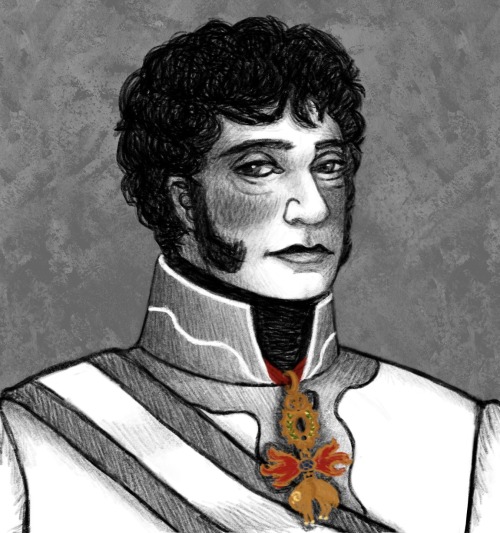
So it was a long time ago in a galaxy far, far away…
Or is it better to say “in a specific historical period full of so much drama and joy that sometimes all of it seems surreal”? Yes, I think that’s it! :)
Long story short, few years ago I tried to post some of my art (rather unoriginal, I would like to say it myself, just some drawing practices from the wonderful paintings of the 19th century…).
But now, now I would love to come back with some artwork dedicated to my favourite historical period aka Napoleonic wars and its major representatives (as well as some non-canonical crack ships which I love with all of my heart~)
Hope you’ll enjoy your stay!
Bon chance à tous! 🌟
Many things were said, many things were seen - at last we’re approaching the finish line! 🎉
So here comes
Part 3 of the main characters in the Kraft’s painting “Battle of Leipzig”
After all the trouble with an escort of three allied monarchs we have a suitable opportunity for a closing speech - a speech about prominent Austrian military men who participated in the Battle of Leipzig and got their moment of fame on the Kraft’s canvas.

Naturally they are led by their general-commander who presided over allied Russian, Prussian, Austrian and German forces - prince Karl Philipp zu Schwarzenberg, Austrian field marshal and experienced diplomat.
Representative of an ancient, well respected family in Habsburg’s monarchy (Franconian/Bavarian heritage with a pinch of Czech influence, money and - notably - property), he was one of the closest and most loyal Metternich’s associates whose gentleness, pliability and diplomatic skills combined with his influence in the army and utter bravery always came in handy when Klemens wanted to accomplish something on an international arena ever since he became chancellor in 1809.
Same thing goes for the war of 1813-1814: since newly formed Coalition needed a commander, probably an Austrian one as Russians and Prussians needed to ensure Austrian involvement in the business against Napoleon, Metternich simply swept other candidates aside (especially archduke Karl von Teschen who probably was the most successful military commander in the Empire… but indescribable boiling h a t r e d between the imperial family and chancellor lurking behind the back of emperor Franz and gracefully pulling the strings was practically insurmountable) and put in an ally he trusted the most.
Like, you know, find yourself a man who can do both! Because Klemens surely found one for himself. ✒️🗡
(This saying actually suits them soooo well, it’s unbelievable. Sometimes I still can’t comprehend how much of “partners in crime” they were (love their dynamic as much as Metternich’s relationships with Friedrich von Gentz) and I will certainly mention them A LOT in the nearest future!)


But for now that’s more than enough chatter about the commander-in-chief, I guess…
Especially when there is such a wonderful pair of true sweethearts behind his back - Hieronymus von Colloredo-Mansfeld and Friedrich VI von Hessen-Homburg, a field marshal and general of the cavalry in the Austrian service! Both went through the Napoleonic wars from it’s start to the very end. Also they properly illustrate the famous notion of “internationalism” which was common amongst the ranks of Austrian Empire’s officials thanks to the legacy of Holy Roman Empire (R.I.P as Napoleon said it himself… ☠️): Colloredo came from a noble family from Friuli (Northern Italy) and Friedrich’s name says it all for him. :)
Even though they seem completely fine on the canvas, both were severely wounded during a fierce confrontation with the troops of Poniatowski, Augerau and Oudinot which took place on the 18th of October. Friedrich who led his hussars in a battle suffered a serious blow…
Fortunately, Colloredo was able to support him in time! Even though he shared the same fate soon, he decided to hide his injury until the positions of allied forces were finally secured. ✊



In the mean time on Schwarzenberg’s left side we can see a fancy cavalry man - count Ignácz Gyulay, another veteran general.
He practically had one job - to stop Napoleon from escaping Leipzig by blocking the western route.
Did he succeed?
Well, to some extent...
It was not enough though.
But, despite some disappointment, we’ve practically collected them all! Czechs, Germans, an Italian and now a Hungarian! Austrian Empire at it’s finest as usual. ✨


And to top this enormous cake with a sweet cherry, I present to you a complete shot in a dark - this ironical looking military man could be Johann von Klenau, one more field marshal to go! His efforts actually saved the whole battle on it’s first day, since he blocked Murat’s fierce cavalry charge and prevented MacDonald’s from flanking the main army (classic Napoleon’s strategy sense I here, heh).
Now that’s what we call a nice save!


And with this small but important victory which can sometimes change the whole course of events I would love to conclude my vast reflection on the Kraft’s painting. It’s a true masterpiece when it comes to all the tiny details and portrayals of the heroes from a distance past.
Thank you all from the bottom of my heart for your attention to the matter!
(Hope you liked it as well, @microcosme11! That was an incredible opportunity, thank you very much! It’s always a pleasure to dig into all these small nuances and facts. 😌)
Das Ende ❤️🤍❤️
So, the thing I love the most about Napoleonic era is that there are soooo many ways of exploring the matter! Basically you can start with any country, affected by the impulse coming from the Revolutionary France, and slowly progress forward, expanding knowledge on national specifics and different “reactions” to the current state of events.
Some people were completely against it, some finally gained much-needed freedom for the development of their own governmental systems, some got essential resources which helped those brave men and women who fought for their own lives and independence of their homelands.
It’s always breathtaking as well when you can trace the links between intellectuals from all across Europe, despite their political preferences or any other kinds of opinion on various aspects of society (because if we start evaluating them from the modern point of view, many of those ideas would seem rather unjust and even infuriating 😅) , as they indicate the same deep connections which people can establish nowadays with the help of social networks and Internet in general.
And even when it comes to those - er - rather unpleasant “ways of thinking”, with which you personally cannot associate, sometimes you acknowledge them nonetheless and even start enjoying to some extent the history of those sophisticated systems which developed over centuries and eventually met their logical end. Not so long ago I’ve experienced this kind of attraction to the Austrian (and German at some point cause, you know, Holy Roman Empire) piece of a metaphorical Napoleonic pie and now I’m slowly falling into the pit of Habsburg’s monarchy shenanigans.
You know, it’s truly… fascinating.
As a Russian who studied history of his home country for his whole life - history and literature classes in school, the whole course on Russian history in university (yep, I’m just a tiny bit of a “historian” myself - undergraduate who dropped out due to overall burnout and urgent necessity to concentrate on his own creative work and all-time favourite historical epoch but who wants to continue his journey eventually) I spot some extraordinary similarities between the struggles experienced by Russian and Austrian Empires - in the 19th century especially.
So it’s some kind of “I feel you, man” experience, I guess. 😂 🇷🇺🤝🇦🇹
Even though my appreciation of Austrian history is very strong, I usually tend to reduce everything to the Napoleonic wars concentrate (or maybe I should finally start calling it “the first half of the 19th century”thanks to historical figures like Metternich - speak of a devil - as these politicians/military men/etc. lived such incredibly long and busy lives that it’s impossible to limit yourself to Napoleonic era only).
And here is one incredible piece on the imaginary “altar” that pretty much reflects my current value system. ✨

As you can see, it’s a miraculous lithograph “made with a feather” ( mit der Feder gemacht ) in 1816 by Adalbert Joseph Kurka.
(Actually, there is a small touch of Photoshop magic: Schwarzenberg was looking the opposite direction in the original picture and I thought it was much more fitting for him to exchange glances with Metternich as they went through all of the troubles successfully! What a relief it was for them, I bet…)
In my opinion, it’s pretty much safe to say that this piece of art probably symbolises the final triumph over Napoleonic France, considering it’s production date. While the Imperial court was minding the state affairs in the Northern Italy which had returned to Habsburg’s monarchy once again, some skilled craftsman depicted the current “balance of power” in the Empire in an artistic form.
So we have a ruling emperor with his beloved eldest son who was only twenty-three years old at the moment… 👑


…And two loyal servants of the imperial crown - a statesman and a military man - whose continuous common efforts finally led to the much-needed years of stability and peace (at least in theory)! 🎉
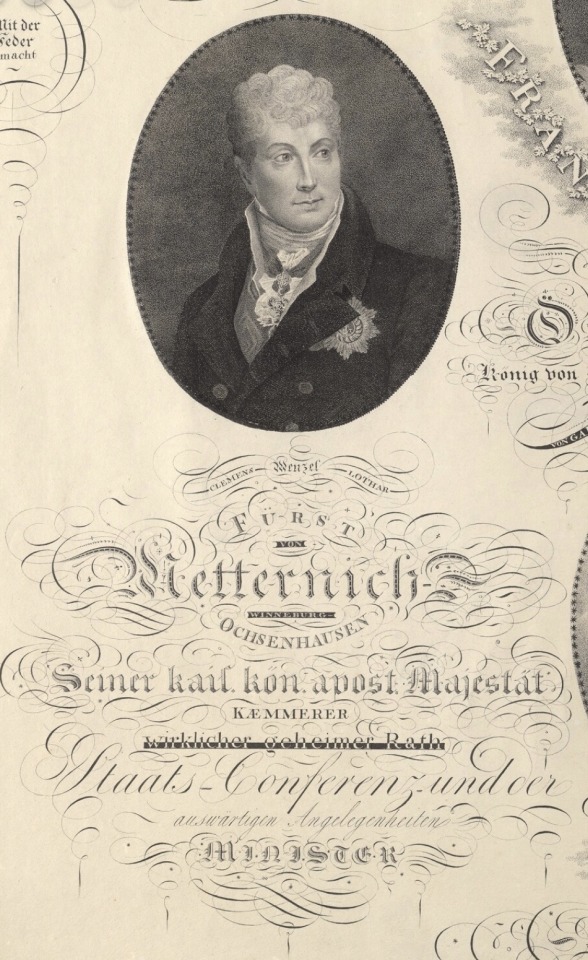
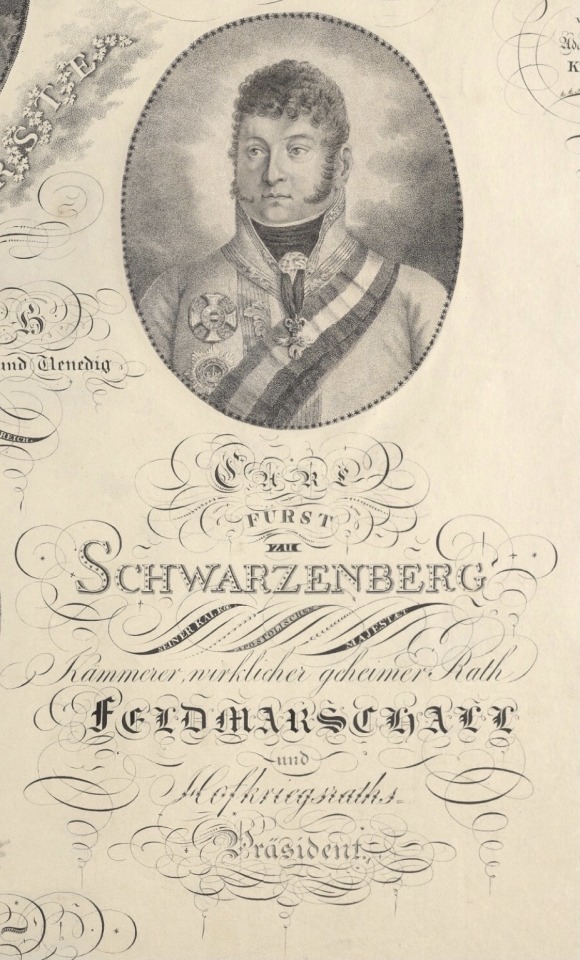
Picturesque calligraphic inscriptions under their portraits read that
Clemens Wenzel Lothar Prince von Metternich-Winneburg-Ochsenhausen [is] His Imperial and Royal Apostolic Majesty’s Chamberlain, Privy Councillor, State Chancellor and Minister of Foreign Affairs
and that
Carl Prince zu Schwarzenberg [is] His Imperial and Royal Apostolic Majesty’s Chamberlain, Privy Councillor, Field-marshal and President of Hofkriegsrath [Court Military Council]
Magnificent sight, isn’t it? :)
Soon I will make a post about how exactly my personal acquaintance with Herr Schwarzenberg had started (that was originally the reason for why it all escalated so quickly a year and a half later).
Stay tuned! 🪄
By now Clemens von Metternich has been constantly present in my life for quite a long period of time, so I am actively manifesting love for him and his incredible family, as most of his children and grandchildren lived extraordinary lives as well!
Same notion goes for Richard and Pauline, Metternich’s own son and granddaughter who married each other due to Clemens approval. They were actual sweethearts and true successors of his former fame (pretty scandalous, may I say so myself) which he earned serving as an Austrian ambassador in Paris. 🇦🇹🇫🇷
And here are some pictures of them together:




In the last photograph Pauline sits with their eldest daughter Sophie on her lap. ❤️
Princess de Metternich, whom I have just mentioned, was one of the most prominent of the women at the Court of the Second Empire. Her husband, Prince Richard de Metternich, was First Secretary to the Austrian Embassy, in all the glory of youth and social success an amiable companion, a graceful dancer, a delightful causeur de salon. Later on, he had come to Paris as Ambassador with this ugliest jo lie laide for wife the daughter of the renowned Johannesberg wine, Comtesse Pauline Sandor whom he married in June 1856. Young, clever, witty, ambitious, with a daring, reckless spirit and a sharp tongue, she carried all before her. She made the brilliancy of Metternich’s diplomatic career. A great favourite at the Tuileries, she held her influence with the Empress even after the downfall of the Empire.
Princess Metternich was very amusing and entertaining. Therasa’s songs and Rogolbosche’s kicks were equally familiar to her, and her burlesque imita- tions of both were so clever that they became a huge advertisement of the originals, sending people flocking in night disguise to the Mabille gardens and the Petit Moulin-Rouge. But with all her recklessness, her love of adventure and her knowledge of the world, she was herself a model of propriety, and her name was never coupled with any love intrigue. She was a woman of refined taste, a fervent partisan of Wagner long before his music became accept- able to the Parisians generally, and it is well known that it was she who prevailed upon Walewski to allow the performance of Tann- hauser at the Opera in 1861. She introduced Liszt to the Tuileries.
She was the first to recognize the genius of the English costumier Worth, who made most of the brilliant and original costumes in which she appeared, and caused admiring astonishment at the Court entertainments. Her love of private theatricals added to the pleasures of the time, and she fre- quently appeared in the tableaux, short comedies and charades that were performed in the long Gallery of Maps at Compiegne - My memoir: Murat,Murat, Caroline Laetitia.


On checking some story about Adam Neipperg, second husband of Marie Louise, I came across Ménéval’s memoirs and his first description of the man. I really felt for Ménéval on reading, because you can tell that he actually really likes Marie Louise - but this is just too much for him to take.
After continuing her journey via Bern, Payerne and Chamounix, Marie-Louise arrived in Aix on 17 July. She was received at Carrouge by General Neipperg, who came to meet her on horseback, greeted her at the carriage door and accompanied her to Aix; it was the second time she had seen him. The sight of him caused the Empress an unpleasant impression which she did not conceal. Besides, Count Neipperg was not endowed with any remarkable external advantages. A black bandage hid the deep scar of a wound which had deprived him of an eye; but this disadvantage disappeared when one looked at him with some attention. This wound even went rather well with the whole of his figure, which had a martial character: he had light blond hair, thin and frizzy. His eyes were sharp and penetrating. His features were neither vulgar nor distinguished; together they announced a man of great skill and subtlety. His complexion, which was generally coloured, lacked freshness; the alteration caused by the fatigues of war and numerous wounds could be felt there.
If you leave out all the polite 19th century euphemisms, I think Ménéval considered Neipperg anything but attractive: worn-out from war, looking older than he was (his real age was 39), with thinning hair and an eye-patch. You can just feel his thoughts: “How could she? And with THAT one?! That guy is dead-ugly!” So he desperately tries to explain to, I think, both the reader and himself how such an unworthy creature could have had any appeal to a woman who had been married to one Napoleon Bonaparte:
He was of medium height, but well built, and the elegance of his bearing was enhanced by the loose fit of the Hungarian uniform. General Neipperg was then about forty-two years old. This man played such an important role for Marie-Louise, and exercised such a great influence on her destiny, that I must try to make known by what qualities he obtained her confidence. Count Neipperg’s demeanour was that of a cautious man. His usual air was benevolent, mixed with a sense of readiness and gravity. His manner was polite, insinuating and flattering. He possessed pleasant talents; he was a good musician. He was active, skilful, unscrupulous, and knew how to hide his finesse under the guise of simplicity; he expressed himself with grace and wrote in the same way. He had a talent for listening; he paid careful attention to the words of his interlocutor. Sometimes his face took on a caressing expression, sometimes his gaze sought to detect the thought. As clever as he was at penetrating the designs of others, he was equally prudent in the conduct of his own. Combining the appearance of modesty with a great amount of vanity and ambition, he never spoke of himself. He was brave in war; his many wounds proved that he had not spared himself.
Once again leaving out all the sinister motivations that Ménéval attributes to Neipperg, we can sum up: Neipperg was restrained, unobtrusive, polite, he listened when other people talked, and even reacted to what they said (truely a fiendish strategy!), appeared simple and modest, plus he was fun to be around.
Yes, you have to wonder how Marie Louise could have fallen for that one after having been married to Napoleon 😊.
…So after a week and a half it’s finally happening! What a relief~
Today’s post will be mostly about nostalgia and contemplation since I keep going back in my mind to those wonderful memories as it was a beginning of a new era in my life (of some sort).
It all started almost two years ago when the world seemed a little more stable and people could travel much more freely. That was the time when I was able to make a short three-day trip to… the Czech Republic!
Nowadays, this incredible country is a home for many monuments and treasures of the imperial past, Holy Roman or Austrian or Austrian-Hungarian imperial past in particular. At some point different noblemen who served the monarchs of those immense Empires were able to get some kind of property there: were they lands, castles or even entire cities…
That’s where the history of House Schwarzenberg shines out the most! ✨
And here is their majestic coat of arms. 🛡

Actually, this noble House was one of the richest Houses in the Empire: they had possessions in Franconia (a historical region in Germany part of which is located in modern day Bavaria (from here actually came their progenitor - the first bearer of the title “Herr zu Schwarzenberg”)), Bohemia (an ancient kingdom which is a part of modern day Czech Republic) and Austria itself! 🇩🇪🇨🇿🇦🇹
Thanks to incredibly beneficial marriages and personal contribution to the glory of the Empire, their fortune grew immensely over time. As usual it was transferred into property, mostly acquired by them in Bohemia. That’s probably why the descendants of this House are considered today more Czechs than anyone else.
(Well, during his lifetime the nowadays head of the House, politician Karel Schwarzenberg, former prime minister of the Czech Republic, continued living between Czechia and Austria because, you know, political reasons… but anyway!)
And as Prague already is one of the most mesmerising cities I’ve ever visited, it was even more fascinating to discover all the magnificent palaces which once belonged to the representatives of the family. So it starts with the Schwarzenberský Palác in the heart of the capital…




…goes to the streets of a small town Český Krumlov in the southern Czechia where the family usually resided when they weren’t living in Vienna…


…continues with the breathtaking sight of the castle Hluboká nad Vltavou, the main familial residence…

…and ends near the robust walls of Orlík (or “Worlik” in German) nad Vltavou, the castle whose most famous owner was one Austrian field-marshal, diplomat and Hofkriegsrath President, Karl Philipp zu Schwarzenberg. :)

He was the main reason why I chose that long tour (even though back then I knew practically nothing about him, his deeds and that important Austrian “piece” of Napoleonic “pie” in general) and why I slowly fell for Austrian history.
(Well, actually, I also read my first biography of Metternich on the same trip and from that point it all got “worse” eventually! 😂)
Soooo now I simply sit here with this very straight-forward, not very talented but good-hearted man on my hands and feel somehow… blessed.
It’s an incredible feeling actually. ❤️

P.S.
After all this time the only thing I feel regret for is my inability to explore all those fascinating sights much more carefully back then. Unfortunately, I had almost no time at all and the season was rather unsuitable (all the palaces are closed from late autumn to early spring since it’s an enormous task to keep the right temperatures inside of those immense buildings) …
I guess, from now on it’s a dream I want to fulfil one day - a long stay in Czechia with an opportunity to visit all the museums and palaces which once belonged to Schwarzenberg’s family. :)
Since I was finally able to make some sort of introduction to the history of House Schwarzenberg and field marshal Schwarzenberg’s family, in addition I would love to share some more photos from my own collection!
Now I simply want to show the solemn beauty of castle Orlík, the main residence of the cadet branch established by field marshal, as it’s entourage is so impressive and the views are breathtaking. ❤️









Perhaps, these photos don’t look as impressive as others, taken from air, for example, nonetheless you can feel all the grandeur and solidity of the residence even standing under its walls!
I wonder how the perception of such a robust castle (it is a literal c a s t l e, not some fancy “palais” in Vienna or Paris) changes, when the late spring comes. You know, when everything is so fresh and bright-green and incredibly lively... 🍃
(Also, as I start thinking about all the vast fields and forests, surrounding Orlík, I clearly understand why Schwarzenberg was so difficult to come by in Paris, even though he occupied such an important post of Austrian ambassador in France since 1809. Yes, he was benevolent, open-minded, amiable and sociable (at least, he visited all the necessary salons as he should) but when time came for some important diplomatic decisions, he was usually absent because of… the hunt.
I get it, that was one of the most common entertainment at the epoch but the coincidences still were truly hilarious! And since he was regularly able to spend fair amount of time in his precious Orlík (end of 1801 - first half of 1805 / beginning of 1806 - end of 1808) which he lovingly reconstructed and expanded, his lands probably offered him almost endless possibilities regarding the hunt.
I guess, for this particular man it was a true passion! 🦌)
Speaking of the hunt, I would love to share one more Schwarzenberg-related story before I go on a small break, tied to the New Year celebrations which are incredibly festive in Russia. :)
This time it will be about grand-grand-parents of field marshal Schwarzenberg: Adam Franz zu Schwarzenberg (1680 - 1732) and Eleonore von Schwarzenberg (nee Lobkowicz) (1682 - 1741). Next to Eleonore you can see a little boy: that’s actually Karl’s grand-father Joseph I zu Schwarzenberg (in whose honour his elder brother was named) (1722 - 1782).
Since I promised to speak more about one particular topic, you can already guess: field marshal’s grand-grand-parents were incredibly passionate hunters (I guess, it actually ran in Karl’s blood)! In the paintings presented below you can see Eleonore in her illustrious attire holding a hunting rifle while her husband Adam wears the ceremonial robes of the Order of the Golden Fleece. 🎖

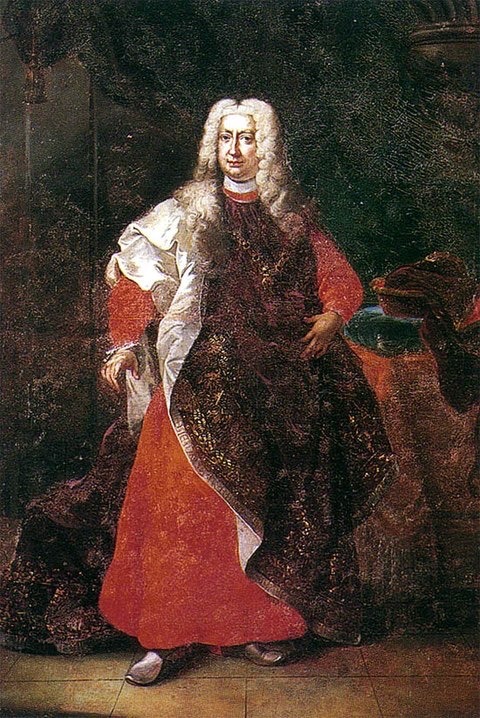
They were so passionate actually that prince Adam himself once hunted a deer with such immense antlers that his record was clogged in the 21st century only! Also those deer antlers have been preserved to this day in a very curious form: they are actually presented on the back side of the facade of Palais Schwarzenberg in Prague.
That’s extremely original, in my opinion! 🦌



Unfortunately, the hunt became the main reason of prince Adam’s death as well: he was shot dead in 1732… by the emperor of Holy Roman Empire, Charles VI. There he is, the man, the legend *aggressive yelling*!
(Was it some kind of a special entertainment for some emperors in the past, I wonder? Can you say something about that, emperor Napoleon? :/)

During that disastrous hunt, they happened to track down the exact same animal and were accidentally placed on the opposite sides of a field. When a deer jumped out of the bushes, emperor took a shot and hit prince in the stomach. Emperor’s physician tried to save his life but it didn’t work out. After 12 hours of agony prince Adam passed away... 😔
Feeling somewhat guilty, the emperor made his 10-year-old son a knight of the Order of the Golden Fleece as well. He grew to become one of empress Maria Theresa’s councillors and earned the rank of imperial prince for his House.
But the main question remains: does the life of a devoted nobleman equal to the most prestigious order in the Empire only…
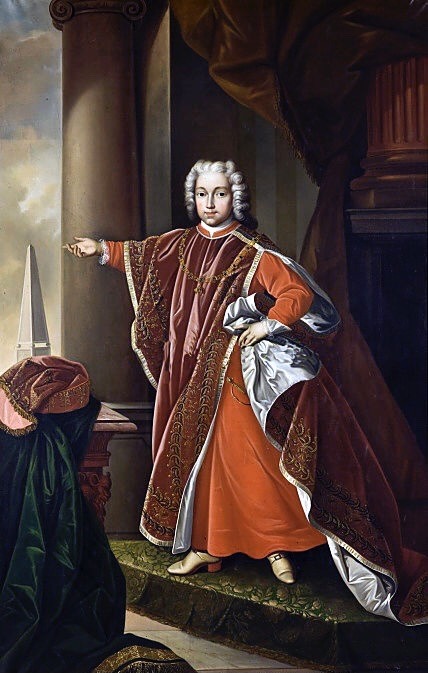
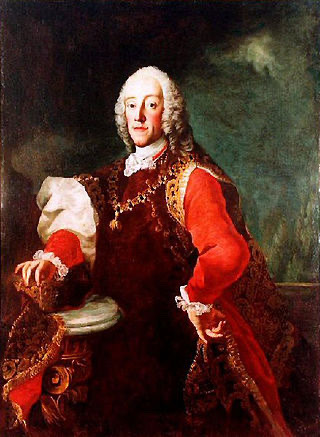
(As a small finishing touch I bring you today the portrait of Johann I zu Schwarzenberg, prince Joseph’s son and field marshal Karl’s father 🤲🇦🇹)
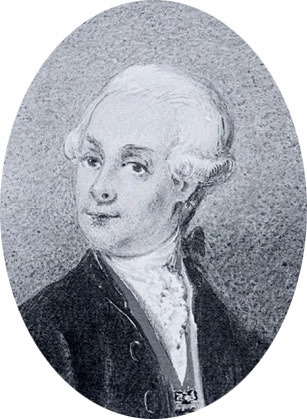
Oh, hi, hello, long time no see! What those weeks have been, oof…
Long story short, I spent all of my time writing a story about Metternich, Schwarzenberg and Radetzky celebrating New 1814 year which is almost (a l m o s t) historically accurate (at least I investigated the literature and resources about the whole situation in the end of 1813 - in the beginning of 1814 rather well) and now feel immensely proud of myself!
It’s an achievement for me, since I was extremely afraid to start. I thought I didn’t possess enough knowledge about the whole situation and the personalities of those prominent men but in the end all turned out wonderfully. Holiday spirit and the essentials of all political struggles were caught successfully! 🎉
I also wanted to draw the whole illustration for this text, however I was left with not that much energy... So instead I made minimalistic studies of the main characters, as it’s always useful to practise. :)
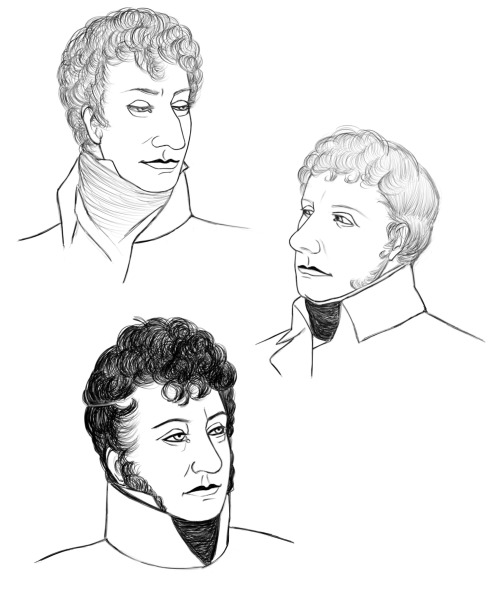
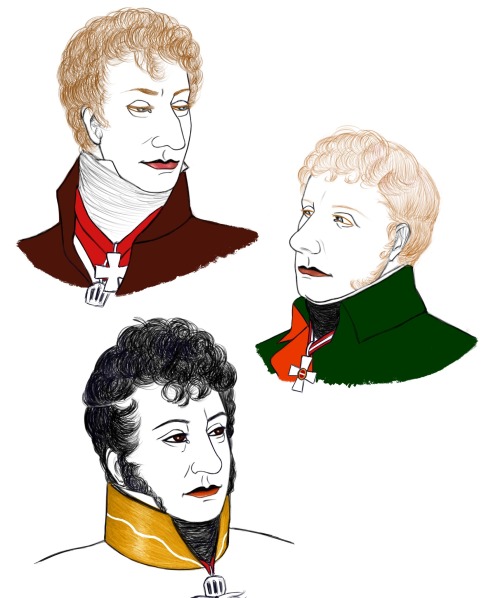
This is also the first fan art I made this year. That’s a solid Austrian start, for sure! 🇦🇹
Tell me, who doesn’t love those historical characters who look all so friendly, benevolent and kind at first sight but actually had to deal with some serious inner struggles? Cause I certainly do! 🧍♂️
It’s actually fascinating how talented some prominent men and women of the past were in hiding their true feelings from the eyes of the public. Yes, it was a common phenomenon since most of them were courtiers... But still!
And when politics had been mixed up with the military concerns and wellbeing of hundred thousands soldiers under your command, everything became especially unbearable. Even if you personally were very well acquainted with both of those turbulent worlds.
From what I have already learned, it seems that field marshal Schwarzenberg’s life went under the banner of one particularly strong emotion - frustration. Now I understand more clearly why and it hurts my heart (at the same time he is one of the most relatable historical characters I’ve ever seen in my life).
His attitude also reminds me of general Bagration’s response to all the intrigues of the Russian imperial court...
One day I wish to speak more about the whole situation! Until then have some emotional illustrations I couldn’t resist making. 🩸


*“Surface Pressure” from Disney’s Encanto playing in the distance*
Recently - a week (or something like that) before - I was able to fully read one of the most exciting pieces of Napoleonic era correspondence I’ve ever found - letters from Metternich to Schwarzenberg and vice versa concerning all kinds of political, military and diplomatic affairs which took place in Europe from the second half of 1813 to the end of 1815! There is a bunch missing as usual but what was left is still an enormous treasure, since they deliver interesting factual details and reveal in its entirety the characters of those two prominent men.
I plan to do some translations into English as certain addresses and turns of phrases are truly wonderful. They show how such correspondence of immense government importance was still a place for describing all kinds of fears and worries, demonstrating honest views (sometimes scandalous even) as well as showing affection. Deep, cordial affection that two old “partners in crime” had for each other for a long period of time.
Before my acquaintance with those precious letters I’ve never imagined how warm their relationships truly were. I understood they were friends. Probably. To some extent, it was at the family level: Schwarzenberg knew Eleonora von Kaunitz, Metternich’s first wife, very well, perhaps, not only because of Maria Louisa’s wedding arrangements in 1809 - 1810 but for his whole life as they were children of the Vienna’s upper class society who had been growing up in the same environment, until Schwarzenberg started his military career in 1786. During the ambassadorial days of 1809 - 1812 Karl was also able to meet Metternich’s children (due to her poor health Eleonora preferred staying in Paris most of the time even after Metternich became a chancellor), found them very cute and amiable. Schwarzenberg’s wife, Maria Anna von Hohenfeld (“Nani” as he called her tenderly), who visited him often with their three sons was familiar with Eleonora as well (I actually stumbled upon one assertion which claimed that the latter experienced some kind of “jealousy” towards the former, since Schwarzenberg was madly in love with Nani, had never cheated on her with another woman and all-in-all was a perfect example of loving husband and father; but that point of view hurts my feelings too much (even though it seems pretty accurate) and I’m sitting over here in denial, sorry! 😅).
So, yeah, I guess, it’s pretty much impossible to remain completely nonchalant towards each other after years of diplomatic (and military afterwards) partnership. But for a long time I had no significant evidence of their direct communication, every assumption in this matter was practically a complete shot in the dark. Now I have some pieces of their correspondence and oh boy, what a rollercoaster of emotions… 💥
Their characters, readable between the lines, are pretty much illustrative. Schwarzenberg who understands very well all the nuances of politics remains open-minded, easygoing and playful. Sometimes even his good-hearted nature becomes unbelievably harsh, when, for example, allied monarchs tried interfering with his direct orders to the army where common soldiers always hang on a brink of hunger. When it comes to Metternich, he is all there with his inflated ego, evil irony, familiar complaints about himself but at the same time it’s necessary to pay tribute to him - he actually tries his best to console Schwarzenberg in all the misfortunes which the post of an allied commander brought to him.
What can I say, the stakes were higher than ever! Metternich understood the importance of his friend’s well-being, since they had to play the game against Napoleon till the very end. Once they positioned themselves as his allies. They eventually became his doom. The political significance of their cooperation is truly somewhere over the top of a roof taking into consideration such a miserable state (financial, especially) in which Austria was during the Napoleonic wars and after them.
Okay, so here it is once again, my love anthem towards these two mischievous Austrians - a military man and a statesman! That’s probably more than enough for one time but I want to show a small illustration as well... 🤲 🇦🇹

The one who led the armies of hundred thousands and the one who pulled thin diplomatic strings on the stage of Europe itself.
How much I love this type of duos, I can’t express it enough! 😩
Next time I’ll try and bring bits of translations I promised. Until then - few lines in French which are mesmerising.
Vous voyez, mon cher ami, que j’éprouve le besoin de vous épancher mon cœur.
Bonsoir, cher ami, que le ciel vous éclaire et nous protège!
Had not enough willpower and intellectual forces to support me through the journey of translation historical documents this week, so I’ll leave this task for the nearest, more fortunate future. 😮💨
At the same time I was finally able to start my own art-account on Instagram, since that’s pretty much my main quest - to spread historical fan-art all over the Internet!
For that occasion I made my first drawing of Friedrich von Gentz, one more mischievous writer and politician at the Austrian service to go. I have started reading his biography and - Gott! - what a fate! Love it immensely, when someone who was destined to become pretty much “ordinary” person with “ordinary” job suddenly breaks all the plans others had for his future (even though he tried to adapt to an “ordinary” life for quite some time) and starts developing his natural talents.
Of course, Gentz is a v e r y controversial person but I guess, I’m just easily fascinated by such kind of men and women. They are usually so miscellaneous, unique and fun to learn about. :)

Small P.S.
I also adapted one of my favourite memes to the Austrian political situation during Napoleonic wars.
Do I feel guilty for what I’ve done? Oh, certainly not! 😂
Just some Austrian general accepting his fate.

Pretty much obsessed with drawing for the past few days, so that’s the only thing I can share here. My bad. 😅
I actually started this illustration in the beginning of January and was finally able to complete it thanks to sudden inspiration which came with the quote belonging to Stendhal. I don’t actually know from which of his works it comes but that’s the way how he described Metternich once.
“Son regard bleu et bienveillant tromperait Dieu lui-même” 🧿 “His blue and benevolent gaze would deceive God himself”

I find this citation unbelievably poetic and mesmerising. Also it’s more than just accurate! Metternich truly was the master of deception~
Okay, I guess, I’m still a bit too shy to translate from French into English even for my personal blog. Nonetheless, I want to make at least few small steps towards my dream project and simply need to find a starting point. :)
For example, I can begin with some interesting passages from the works of Russian researchers, concerning the political situation on the eve of the Sixth Coalition’s formation!
I’ve discovered this particular book only recently but already found curious observations about the prospective position of Austria as an international arbitrator (at least, that’s how Metternich envisioned it in his dreams), before circumstances finally forced Austria to join the Coalition.
“Austrian diplomacy in March-April 1813 was darting between Russia and France, trying to force both powers to move in the right direction designated by Vienna. Sometimes it seemed, despite the certain setbacks (as, for example, in the case of England), that everything was going exactly as the clever Viennese diplomat had planned. Metternich spared no effort and time to convince Napoleon and Alexander I through his subordinates that "only the power that wants nothing but peace for itself can be an intermediary." Austria wanted not only peace — it wanted to remain a power that alone decides all issues of the future territorial structure, and also serves as a kind of buffer zone between the two great empires (while extending its influence to the whole of Germany and the Balkans). To achieve this, it was necessary first of all to withdraw from the alliance with France, while convincing Bonaparte of the sincerity of Vienna's peacekeeping initiatives. And Russia, on the contrary, had to be kept at arm's length, in no case making any promises to Alexander I, who persistently convinced Metternich and Emperor Franz himself of the necessity and importance of Austria joining the coalition.
Playing on two fronts is always fraught with serious complications, especially if the task is to keep an equal distance from both fronts. But Metternich managed it for the time being. Although there was still some distortion: relations with France were more important for Austria at that time. The explanation was very simple — they were afraid of Russia in Vienna. "Recent events have shown us how dangerous Russia can be for Europe... We need a power equal to it, which will balance it — France is such a power: it should establish the foundations of a new system of European equilibrium," Karl zu Schwarzenberg bluntly told French Foreign Minister Y.-B. Mare in Paris on April 7, 1813 before meeting with Napoleon. And the bet on Napoleon seemed justified to Metternich.”
At the time Metternich’s ambitions were truly grandiose (as grandiose as his own flamboyant persona)!
Aside from that I also have to add commentaries, since the author of the book seems to me somewhat “biased” (or as a Russian myself I simply sense a bit of “patriotic” exaggeration): they were not “afraid of” Russia in Vienna, it’s just the fact that two opposite parties existed. The first one was inclined towards pro-Russian political course and the second one rooted for the balance between the two countries - Russia and France. The first one seemed to be much more numerous: not only Vienna’s aristocrats but also the major part of the Imperial family had been sympathising with the struggles of Russians for a long period of time. Those sentiments only grew stronger during the campaign of 1812. However, they lacked one crucial thing - the influence on the Emperor Franz himself. This particular influence was still the sacred privilege which belonged to his fellow minister, chancellor, etc, etc, in the face of Metternich. Klemens also was that lone, though stoic mastermind of the second party - party of balance.
As for Schwarzenberg he shared most of Metternich’s opinions regarding the matter. This man was very well familiar with both sides - Russian and French - thanks to his ambassadorial service and he witnessed the might of military potential which belonged to both of these countries from the front row as well. Besides, the key to active actions - emperor Franz’s good will - remained in Metternich’s hands, thus nothing could stop them from trying to settle the whole situation on their own intermediary terms.
Nothing but the fact that Napoleon didn’t want to cooperate, until for him it was too late! 😅
Moreover, this whole discourse made me remember another exemplary passage from my favourite Russian biography of Metternich (who could have guessed).
“On December 20, 1812, Schwarzenberg's auxiliary corps was advancing towards Warsaw to prevent the Prussians from invading deep into the territory of the Grand Duchy of Warsaw. Schwarzenberg's position can be judged by his own words: "The more both colossi [meaning Russia and France] mutually weaken each other, the better." With a soldier's straight-forwardness, he expressed what was now on Metternich's mind.”
So yeah, Metternich, Schwarzenberg and that one collective brain cell they were sharing. 😘🤝😊
P. S.
By the way, it’s not about them, Napoleon and Alexander, it’s Austrian raison d’état! Nothing personal, just politics. 🇦🇹
Was surfing on the waves of the Internet as usual, when suddenly discovered an original painting made by Robert Waissenberger in 1829. It depicts the office of chancellor Metternich at the Staatkanzlerei which was located in the large western wing of Palace Hofburg in the heart of Vienna.
I only saw the black-and-white lithograph, portraying this place of political wonders, before. That’s also the main reason why the vibrant colours of this original work caught me off guard but at the same time charmed me right away.

So, this is how the “resident evil” looked like. Who could have guessed…
Besides, canvases of the Biedermeier period always strike with such comfy and domestic feeling that it inevitably encourages the urge to go there, take a sit and simply contemplate. ☕️🍫
Would love to do it myself for an hour or so. :)
So, I wasn’t much active lately but still have some things to share, even though they are not as serious as they could be. X)
Memes - to be exact!
And here is one of my favourites among all I’ve ever made. 🤌

Now it’s reflection time! 🤔
So, the relationships between Metternich and kaiser Franz were one of a kind, for sure.
They were friends of youth, since Klemens was introduced to him on his father’s - emperor Leopold’s - coronation in 1790 when Franz was only an archduke.
They remained pretty close through all the upcoming years (Metternich’s marriage in 1795 and his entry into the close circles of Vienna’s noble society gave him much more freedom in contacting with his august maître (even though ever since he married Eleonora, pretty much everybody in Vienna were already set against that pitiful parvenu from Rhein)) and Metternich’s influence on Franz reached it’s peak after the disastrous campaign of 1809 and the peace of Vienna, when Stadion - the main representative of the war party - was finally removed from his position in the Foreign Office.
The chancellor’s seat was empty and who could occupy it if not the able Austrian ambassador to France who came back recently from the heart of the European diplomacy - from Paris. Who knew (or simply pretended (or even imagined that he knew)) Napoleon’s character and his plans for the future. ✨
Thus, Metternich finally took what he wanted and got almost limitless access to the emperor. And from now on hatred towards him of the most powerful houses in the Empire and the members of the Imperial family was growing stronger each and every day…
When it comes to Franz and Klemens relationships, I personally perceive them as fairly complicated ones. It all seems rather obvious but the thought that Franz’s own principles (those of never changing but everlasting Habsburg’s monarchy), perhaps, influenced Metternich himself and slowly turned him into that petty reactionary whom he became in the last years of his life still gives me chills.
Don’t get me wrong, Klemens was initially predisposed towards that political course he chose later in his life, it’s clear…
Buuuut there was definitely something more, in my opinion. 🤫
That’s definitely for you, @marcvt! 🤗🇦🇹
I finally watched The Sound of Music and like I get it now, I get it.
It’s a beautiful two hour love story of a strict man finally opening his heart again and then a fifty minute public service announcement to hate the nazis. Brilliant.

St. Stephen's Purse - A reliquary in the form of a purse which once held the blood stained soil of the martyr Saint Stephen, Austria, 9th century AD
from The Kunsthistorisches Museum - Imperial Treasury